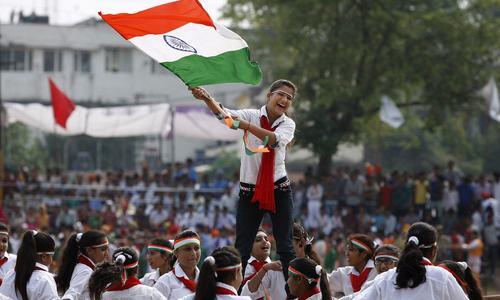WASHINGTON: The United States strongly supports India’s role in global institutions, like the Nuclear Suppliers Group (NSG) and the United Nations Security Council, says a statement the State Department shared with Dawn.
The statement, attributed to the US ambassador in New Delhi, reinforced the US desire to “continue to work constructively” with the NSG members to admit India into the organisation.
At a Monday briefing in Washington, State Department spokesperson Elizabeth Trudeau also welcomed India’s entry into the Missile Technology Control Regime (MTCR), saying that the country had already demonstrated a sustained commitment to non-proliferation.
On Monday, India joined the MTCR as a full member, almost a year after it formally applied. The MTCR is an informal, voluntary association of nations which checks the proliferation of missiles and unmanned aerial vehicles (UAVs) capable of carrying weapons of mass destruction (WMDs).
India’s success with the MTCR came days after it failed to join the NSG. Last week, about a dozen nations, led by China, refused to admit India into the NSG, noting that it did not fulfil membership requirements.
The NSG guidelines require an applicant to sign the nuclear Non-Proliferation Treaty (NPT) and both India and Pakistan that applied for membership in last week’s plenary session in Seoul have not signed this treaty. While Pakistan was ready for the refusal, it was considered a major setback in India where opposition leaders blamed Prime Minister Narendra Modi for the failure.
“We were disappointed India was not admitted during this recent session, but we will continue to work constructively with India and all the NSG members on India’s accession in the months ahead,” said the statement the State Department shared when asked for comments on the development.
At Monday’s news briefing, however, India’s admission into the MTCR was welcomed as a significant achievement. Ms Trudeau noted that India was admitted into the MTCR because it “demonstrated to all MTCR partners a sustained commitment to non-proliferation and it has a legally based effective export control system”.
This system “puts into effect the MTCR guidelines and procedures and administers and enforces such controls effectively,” she added.
Ms Trudeau said that all 34 MTCR members, including the United States, agreed India met the standard and that its membership would strengthen international non-proliferation.
The statement on the NSG, however, went beyond the developments in Seoul and underlined President Obama’s “reinforced” and “strong support” for India’s “role in global institutions, like having a seat on a reformed UN Security Council.”
The United States “continues to welcome India’s interest in Asia-Pacific Economic Cooperation (APEC); and we strongly affirmed our support for India’s accession into the multi-lateral export control regimes,” it added.
The statement explained that six years ago, President Obama first expressed his support for India’s membership in the NSG and since then the United States has worked closely with India and the NSG members to help advance New Delhi’s case for membership.
“India has a strong record, and deserves to be included in the NSG. That is why the administration, including senior White House and State Department officials, made a concerted effort to secure India’s membership in the recent NSG plenary session held in Seoul,” it added.
Meanwhile, diplomatic circles in Washington point out that India’s entry into the MTCR will not automatically allow India to sell or buy missiles or other sensitive technologies from member states.
The regime coordinates a common export policy that regulates the sale of any missile or UAV systems or sub-systems. It maintains a common list of items, including dual-use technology and components, which can be used to deliver WMDs or enable the building of systems which can do the same.
The MTCR, however, is not a treaty and does not impose any legally binding obligations on its adherents and members. The regime’s guidelines do not distinguish between exports to member or non-member countries. And membership does not provide any specific or special entitlement to obtain technology from member states.
Published in Dawn, June 29th, 2016













































